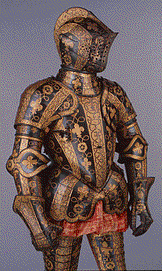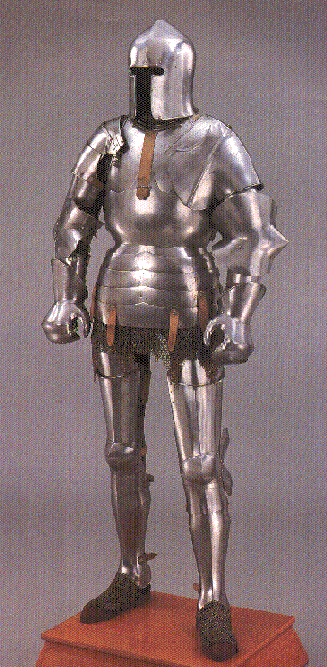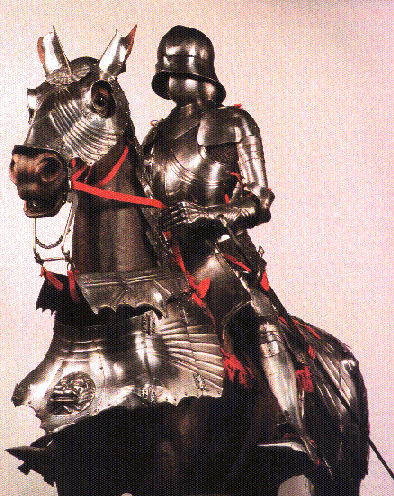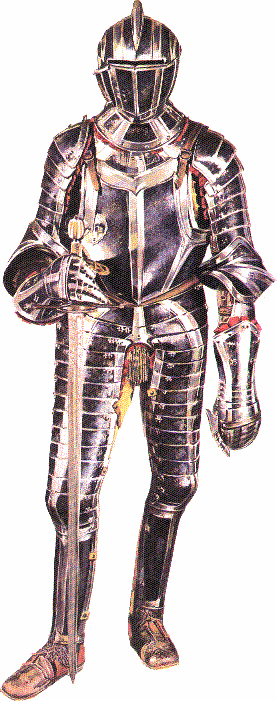In this passage, we find ourselves in King Arthur's court during a Christmas feast. A Green Knight has just proposed a challenge before the court, a game in which a blow for a blow shall be given. Seeing that no one is willing to accept this challenge, King Arthur himself steps up to the Green Knight, ready to defend his honor. Sir Gawain, being a noble knight, asks the court if he can replace King Arthur in the game. His wish is granted.
 The
passage begins as King Arthur calls Sir Gawain to his side to give him
his weapon and blessing. As Gawain kneels before his lord, King Arthur
says: "Keep, cousin what you cut with this day, and if you rule it aright,
then readily, I know, you shall stand the stroke it will strike after."
(Norton p. 210) With these words King Arthur implies that since
Sir Gawain has the first hit, he has nothing to worry about, since the
Green Knight will be dead and unable to return the blow.
The
passage begins as King Arthur calls Sir Gawain to his side to give him
his weapon and blessing. As Gawain kneels before his lord, King Arthur
says: "Keep, cousin what you cut with this day, and if you rule it aright,
then readily, I know, you shall stand the stroke it will strike after."
(Norton p. 210) With these words King Arthur implies that since
Sir Gawain has the first hit, he has nothing to worry about, since the
Green Knight will be dead and unable to return the blow.
The Green Knight asks Gawain to go over the terms of the game and asks to know his name. Gawain replies: "In good faith, Gawain am I whose buffet befalls you, what'er betide after, and at this time twelvemonth take from you another with what weapon you will, and with no man else alive." ( Norton p. 210 ) In this statement Gawain not only asserts himself but also makes sure that if he kills the Green Knight with his blow, no one shall take his place.
 Satisfied
with that answer, the Green Knight reminds Sir Gawain that he must find
him on his own, as promised before the court. However when Gawain asks
the Green Knight where his home could be found, the Green Knight delays
his answer, saying that Gawain will know soon enough after the blow where
to find him. Not finding out the true identity of the Green Knight may
be Gawain's first mistake. It is always important to know your enemies,
especially when a very big, very green knight, who comes out of nowhere,
presents one with a challenge.
Satisfied
with that answer, the Green Knight reminds Sir Gawain that he must find
him on his own, as promised before the court. However when Gawain asks
the Green Knight where his home could be found, the Green Knight delays
his answer, saying that Gawain will know soon enough after the blow where
to find him. Not finding out the true identity of the Green Knight may
be Gawain's first mistake. It is always important to know your enemies,
especially when a very big, very green knight, who comes out of nowhere,
presents one with a challenge.
 Having
resolved the terms of the agreement, the Green Knight gets ready for the
blow by kneeling down and moving his long green hair away from his neck.
Gawain skillfully grips the ax and strikes the Green Knight with all his
might, cutting through the flesh with such force that the blade ends up
in the ground. The head falls from the bleeding body and rolls on the floor
under the feet of the observers. But, to everyone's surprise, the Green
Knight doesn't fall. Instead, he stands up, stretches out his hand and
picks up his fallen head. He then mounts his horse and sits with his head
in hand ready to speak as everyone watches in shock.
Having
resolved the terms of the agreement, the Green Knight gets ready for the
blow by kneeling down and moving his long green hair away from his neck.
Gawain skillfully grips the ax and strikes the Green Knight with all his
might, cutting through the flesh with such force that the blade ends up
in the ground. The head falls from the bleeding body and rolls on the floor
under the feet of the observers. But, to everyone's surprise, the Green
Knight doesn't fall. Instead, he stands up, stretches out his hand and
picks up his fallen head. He then mounts his horse and sits with his head
in hand ready to speak as everyone watches in shock.
 T
hus this passage ends, but it's only the beginning of things to come. In
this passage Gawain is seen as a hero, a noble knight who steps up to the
challenge, defending his lord and his kingdom. However, Sir Gawain is not
perfect. He is a human being capable of making mistakes. Yet he remains
a hero not because he is flawless, but because he is able to learn from
his mistakes, becoming a better person as a result.This passage then, is
start of a journey of Sir Gawain through many challenges, that will ultimately
not only bring his fall, but also his subsequent return to the court as
a better men. This concept of felix culpa 'fortunate fall' is being alluded
to through mentioning of Felix Brutus in line 13 of the tale. Brutus was
a great-grandson of Aeneas and a legendary founder of Britain. Only here
is he given the name "Felix", meaning favorable and fortunate. This tells
the reader that he was fortunate in being able to overcome obstacles in
his path and rising as a leader of Britain. This is in spite of the fact
that he was doomed to fail, labeled in a prophecy before his birth as a
son of death who would kill his parents and be hated by all men.
T
hus this passage ends, but it's only the beginning of things to come. In
this passage Gawain is seen as a hero, a noble knight who steps up to the
challenge, defending his lord and his kingdom. However, Sir Gawain is not
perfect. He is a human being capable of making mistakes. Yet he remains
a hero not because he is flawless, but because he is able to learn from
his mistakes, becoming a better person as a result.This passage then, is
start of a journey of Sir Gawain through many challenges, that will ultimately
not only bring his fall, but also his subsequent return to the court as
a better men. This concept of felix culpa 'fortunate fall' is being alluded
to through mentioning of Felix Brutus in line 13 of the tale. Brutus was
a great-grandson of Aeneas and a legendary founder of Britain. Only here
is he given the name "Felix", meaning favorable and fortunate. This tells
the reader that he was fortunate in being able to overcome obstacles in
his path and rising as a leader of Britain. This is in spite of the fact
that he was doomed to fail, labeled in a prophecy before his birth as a
son of death who would kill his parents and be hated by all men.
 It
is clear then that there can be no redemption without fault, just as one
is unable to return from exile without first being sent into one. One's
worth is only so much greater after a return from a fall, since if one
is flawless, one has nothing to gain and therefore nothing to teach to
others. Likewise, those who have fallen from the top and then struggled
to climb back up are looked up to as role models. Furthermore, in today's
society, more respect is given to those who have struggled to achieve success
than to those who have come to power and wealth thorough lineage.
It
is clear then that there can be no redemption without fault, just as one
is unable to return from exile without first being sent into one. One's
worth is only so much greater after a return from a fall, since if one
is flawless, one has nothing to gain and therefore nothing to teach to
others. Likewise, those who have fallen from the top and then struggled
to climb back up are looked up to as role models. Furthermore, in today's
society, more respect is given to those who have struggled to achieve success
than to those who have come to power and wealth thorough lineage.
Sir
Gawain's fall is therefore fortunate because it leads to his return as
a better knight who has learned humility and the true meaning of honor.
This passage carries great significance through the tale because it sets
the stage for Sir Gawain's fall and a journey from which he shall return
a greater man.
